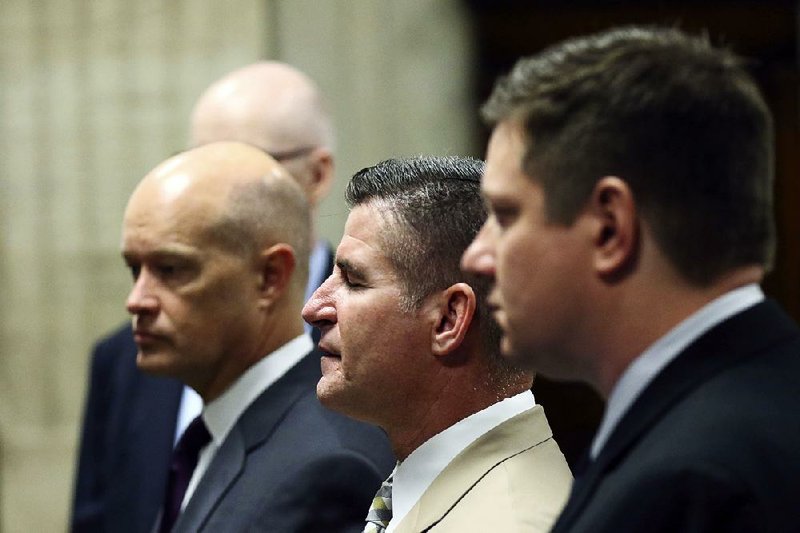Chicago officer's murder trial nears end
CHICAGO -- Testimony in the first-degree murder trial of a Chicago police officer in the 2014 shooting of Laquan McDonald concluded Wednesday morning, ending the trial just a day after the officer provided sometimes emotional and sometimes defiant testimony that what he saw did not unfold the way it did on dashcam video.
Defense attorneys did not call any witnesses on Wednesday but did put into evidence the squad car tire that McDonald stabbed with a knife before Officer Jason Van Dyke arrived and shot him 16 times.
Prosecutors called one rebuttal witness who testified briefly and read into the record what Van Dyke told Chicago police Det. David March shortly after the shooting -- including a statement that Van Dyke made that McDonald had raised a knife at him and kept pointing at him even after he was shot and fell to the ground. Van Dyke gave similar testimony on Wednesday -- contradicting the video that shows no such actions by the teen.
The attorneys are scheduled to give their closing arguments to the jury when they return to court today.
The video shows Van Dyke exit his vehicle and start firing even as McDonald appears to veer away from police. After the bullets start, McDonald spins and falls to the ground. Van Dyke continues firing, shooting a total of 16 shots. About 10 other officers were on the scene, and prosecutors stressed that none of them -- including Van Dyke's partner -- opened fire.
In testimony Wednesday, Van Dyke said McDonald was getting closer to him and was ignoring repeated commands to drop the knife. An autopsy showed McDonald had the hallucinogenic drug PCP in his system.
Missouri abortion clinic loses license
JEFFERSON CITY, Mo. -- Missouri is down to one clinic providing abortions as of Wednesday after the only other clinic in the state that performs the procedure failed to adhere to new state requirements and its license expired.
The Columbia clinic's abortion license expired Tuesday, Planned Parenthood Great Plains spokesman Emily Miller said.
Federal appeals court judges ruled last month that Missouri can enforce a requirement that doctors must have admitting privileges at nearby hospitals before they can perform abortions. The judges issued a mandate Monday for that rule to officially take effect.
The Columbia Planned Parenthood clinic has been unable to secure physician privileges or find a doctor with those privileges after a panel of medical staff at University of Missouri Health Care voted to stop offering those privileges altogether in 2015 amid a Republican-led legislative investigation on abortion in the state.
Miller said the clinic cancelled abortions scheduled for Wednesday in Columbia, which would have been the first since the mandate was issued.
Women seeking abortions can go to Planned Parenthood's St. Louis clinic -- which is now the only facility in Missouri where abortions can be performed -- or travel to neighboring states, she said.
Houston ordinance hinders robot brothel
HOUSTON -- A Canadian company's plan to open a so-called robot brothel in Houston has been short circuited by city leaders.
On Wednesday, the Houston City Council voted to update an ordinance to specifically ban individuals from having sex with an "anthropomorphic device," a device that resembles a human being, at a sexually-oriented business. But the change wouldn't ban the company from selling the dolls for use elsewhere.
The city ordinance that was updated deals with the regulation of adult arcades and adult mini-theatres in Houston and classifies a robot as an arcade device.
The company, KinkySdollS, had previously said it wants to open a "love dolls brothel" in Houston in which people would be able to use its human-like dolls.
KinkySdollS, didn't immediately return emails seeking comment Wednesday.
It would have been the company's second location. The first location opened in 2017 in Toronto. On its web site, KinkySdollS says its human-like dolls, which can speak and feel warm to the touch, are available for sale or rent. The dolls can cost more than $3,000 each.
Mayor Sylvester Turner said a business could sell such robotic devices but individuals couldn't use them at the premises before buying them.
Arrest made in suspicious mail case
SALT LAKE CITY -- A U.S. Navy veteran in Utah was arrested Wednesday in connection with suspicious envelopes that were sent to President Donald Trump and top military chiefs.
William Clyde Allen III, 39, was taken into custody in the small northern Utah city of Logan, said Melodie Rydalch, a spokesman for the state's U.S. attorney's office.
The arrest comes after authorities confirmed an investigation into two envelopes once thought to contain ricin and later found to contain castor seeds, the substance from which the poison is derived. They can cause injury if swallowed.
The envelopes addressed to Defense Secretary James Mattis and the Navy's top officer, Adm. John Richardson, were isolated at a mail screening facility and sent to the FBI. Neither envelope entered the Pentagon.
A Section on 10/04/2018

